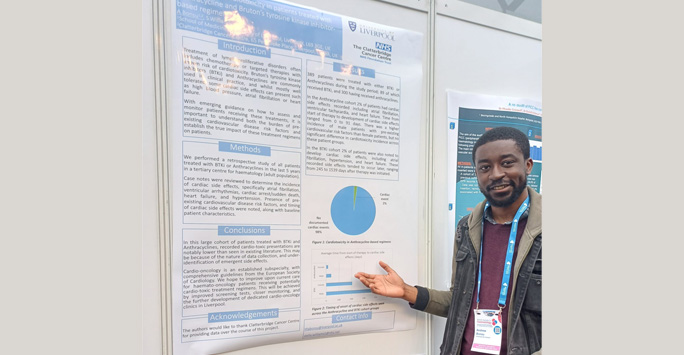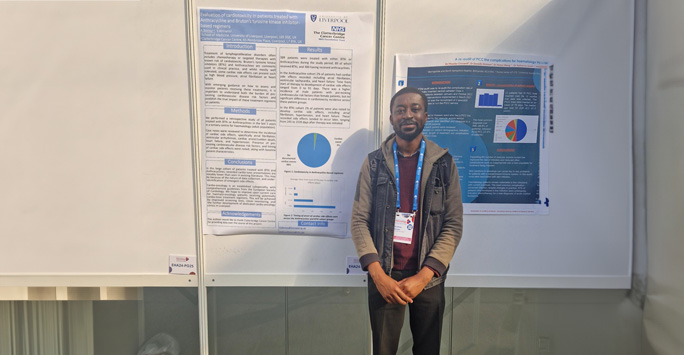
The British Society of Haematology Conference took place in April, and Student Doctor Andrew Bonsu traveled to Glasgow to present his topic in front of an audience of experts and delegates.
Andrew, final-year Graduate Entry Medicine student from East London, has had his passion for medicine fuelled by three key experiences that motivated him to actively help others through the medical profession.
“In July 2012, my Aunt Diana passed away from typhoid in Ghana, a relatively manageable condition here in the UK but the discrepancy in healthcare in Ghana meant that she lost her life. In June 2017, a close family friend passed away two weeks post-Caesarean section due to septic shock. This was a tough ordeal particularly as it related to delayed VTE prophylaxis measures and a year later, my Aunt Georgina had succumbed to breast cancer.
These three experiences left a persistent message in my mind: ‘Although death is inevitable, was it their time now to go?’ Initially, I considered nursing but volunteering at my local hospital shifted my perspective to consider Medicine.
I’m an avid Manchester United fan (apologies to the readers!) but had been raised to appreciate Liverpool through stories my mother would tell, from the YNWA songs to the Liverpudlian community spirit to the overall friendliness by anyone and everyone. To that, I explored my options for Graduate Medicine courses, and it was a great discovery to find that Liverpool offered this opportunity. Thus, I applied in October 2019 and received an unconditional offer to study here.
My presentation at the British Society of Haematology Conference related to the use of specific chemotherapeutic agents that are used to treat Chronic Lymphocytic Leukaemia (CLL). Whilst these drugs are effective in treating CLL, they are often laden with a range of side effects including irregular heart rhythms and hypertension.
My research looked into the incidence of these side effects in patients who did or did not have risk factors.

Student Doctor Andrew Bonsu ready to present his research
I found this particularly interesting as it allowed me to evaluate the timeline of several patients’ journeys and how it ended. It was challenging as the sample pool was 389 patients that I had to review in 3.5 weeks but, because I enjoyed the topic, it made the review process more manageable.
Haematology has been a specialty that I have been considering for a while, due to the enhanced scope of research and knowledge gained in treating niche conditions.
As such, I was fortunate to have my fourth-year summer elective at Clatterbridge Cancer Centre in Liverpool working alongside Dr Stella Williams. This elective project was a great experience and Dr Williams was a very helpful mentor during the project, assisting me in tailoring the abstract for conference submission.
It was great to meet people from across the world – researchers from Nigeria, America, India and the UK - all coming together to present diverse topics of haematology.
I initially felt daunted - how would my topic compare against, for instance, PhD researchers? But having people of all stages of Academia credit and be intrigued by my presentation swept away those thoughts.
There have been so many learning points I took from then but the most important point for me was “Always aim to learn to help the patient have an improved quality of life”. Yes, learning about a rare therapy approach can be an exciting venture but if the focus deviates from the ultimate goal of patient care, it is not used to the best of intentions.

During my time at Liverpool, I have had quite a lot of highlights thus far, but I would say to date, winning the Dr Barry Enoch Good Doctor Prize last year was the biggest highlight as I was able to express at length the necessary attributes of effective communication alongside compassion.
I’ve continued to be committed to the things that I find most dear to me, including my faith, my family and my free time for creative exploits. As great as Medicine is, if there is no space for other matters in my life, I cannot take anything new to help strengthen my patient-centric approach. Time-balance is a useful skill to have for both in and out of the hospital, aim for the tasks to be done on time, handover the tasks outstanding and enjoy the free time to unwind and rest.
Reflecting on my experience, I would say to myself these simple words to my first-year self: ‘Embrace this once-in-a-lifetime opportunity with this degree as it is only here whereby you can come across the beginning and end of life all in one day, you will not regret it.’ I am now looking forward to transferring the foundations of Medicine built as a medical student and apply it now as a FY1 Doctor, looking forward to the new challenges that await.”